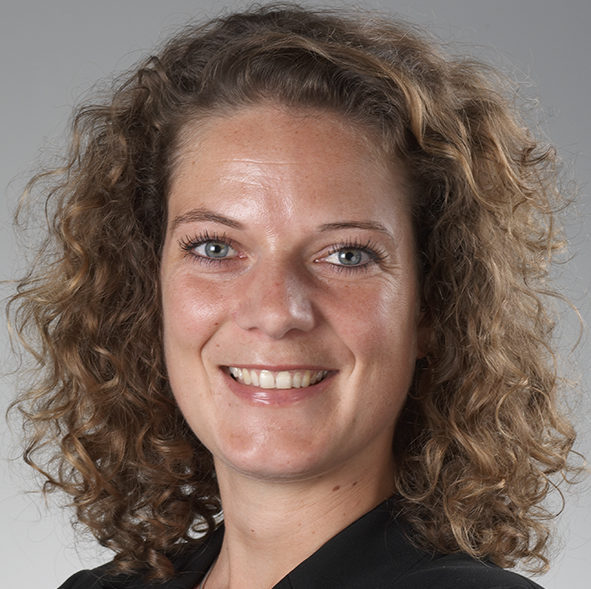Mirjam Pijnappels

Vrije Universiteit Amsterdam
Van der Boechorststraat 9, 1081 BT Amsterdam
room MF A433
+31 20 59 88467
General Interests
My research aims are to understand the effects of ageing on neuromuscular and cognitive aspects of mobility (i.e., physical function and physical activity) and to implement this knowledge with assistive technology to maintain and promote mobility of older individuals in their own environment. In my research projects, I combine experimental and field studies to reveal determinants for mobility problems and falls on the short and on the long term, i.e. within seconds and over months.
Achievements
I have contributed in the understanding of underlying neuromechanical, physiological and cognitive factors for balance control and falls and targets for interventions. I have contributed to the understanding of underlying neuromechanical, physiological and cognitive mechanicsms for decline of mobility with age, in identifying (individual) predictors for mobility decline (among which fall risk) and targets for intervention, in using technological instruments to assess and interact with daily physical function and activity and in improving mobility of older individuals in their environment.
Current Research
My current research approaches are experimental studies (neuromuscular and biomechanical analyses), epidemiological studies (prediction models based on longitudinal cohort data), implementation of technological devices (e.g. accelerometry, kinect, smartphones, smartwatches) and interventions on fall prevention and active ageing in daily life behaviour. Examples of my current projects are my VIDI project “Falling: a mismatch between self-perceived and actual abilities in older adults?” and the EU PreventIT programme.
Résumé
I obtained my PhD in 2004 from the Vrije Universiteit Amsterdam, based on thesis entitled ”Recovery from a trip in young an older adults”. I have been affiliated to the faculty and department of Human Movement Sciences at this university since to continue my work on the effects of ageing on balance control and falls. I was appointed as full professor in Mobility in Ageing in 2016. I gratefully received a personal VENI grant (2006), a TOP grant (2009), a VIDI grant (2014) and Aspasia grant (2015), all by the Dutch Netherlands Organisation for Scientific Research (NWO). I was a PhD supervisor in the Erasmus Mundus Joint Doctorate Programme Move-Age and currently am a co-PI in the EU Horizon 2020 programme PreventIT.
Personal news…
- There are currently no news available
Corporate news…
- There are currently no news available
Research…
Falling: a mismatch between self-perceived and actual abilities in older adults?
Falls occur when we are exposed to balance threats and do not have the capacity to respond adequately. When our capacities decline with age, do we adjust our behaviour accordingly? Overestimation of ones own capacities may lead to risk-taking and consequently to falls in daily activities. Underestimation, by contrast, may lead to sedentary behaviour and ...FARAO: Fall Risk Assessment in Older Adults from accelerometry in daily life
In the FARAO project we focussed on predicting falls based on daily life gait characteristics obtained with one-week accelerometry data. Our system is based on miniature accelerometers (MoveMonitor) and has been worn by more than 300 participants. We found that gait quality measures of daily life gait have added value to predicting falls.Keep Control: Efficacy of perturbation-based gait training in older adults
The overall aim of this project is to test the potential of the such perturbation-based training by use of a newly developed dual-belt treadmill, with options for fast, ecologically valid trip and slip perturbations, triggered in various gait phases, to improve dynamic stability and prevent falls in older persons at risk for falls.PreventIT: Early risk detection and prevention of functional decline in young older adults with ICT support
In PreventIT, we develop mobile technology that enables early identification of risk factors for functional decline in younger older adults. Furthermore, in PreventIT we develop and evaluate a unique ICT-based intervention, delivered on a smartphone and smartwatch, with activities integrated in daily life and taking into account each person’s individual motivation, needs, and barriers.
Network…
- No activities at the moment.
Excerpts of scientific work
- The Short Physical Performance Battery does not correlate with daily life gait quality and quantity in community-dwelling older adults with an increased fall risk
The Short Physical Performance Battery does not correlate with daily life gait quality and quantity in community-dwelling older adults with an increased fall risk
van Gameren, M., Voorn, P. B., Bossen, D., Hoozemans, M. J. M., Bruijn, S. M., Bosmans, J. E., Visser, B. & Pijnappels, M., Oct 2024, In: Gait & posture. 114, p. 78-83 6 p.Research output: Contribution to Journal › Article › Academic › peer-review
- The association between peripheral neuropathy and daily-life gait quality characteristics in people with diabetes
The association between peripheral neuropathy and daily-life gait quality characteristics in people with diabetes
Hulshof, C. M., van der Leeden, M., van Netten, J. J., Gijssel, M., Evers, J., Bus, S. A. & Pijnappels, M., Oct 2024, In: Gait and Posture. 114, p. 152-159 8 p.Research output: Contribution to Journal › Article › Academic › peer-review
- External Validation and Further Exploration of Fall Prediction Models Based on Questionnaires and Daily-Life Trunk Accelerometry
External Validation and Further Exploration of Fall Prediction Models Based on Questionnaires and Daily-Life Trunk Accelerometry
Zhang, Y., Weijer, R. H. A., van Schooten, K. S., Bruijn, S. M. & Pijnappels, M., Aug 2024, In: Journal of the American Medical Directors Association. 25, 8, p. 1-8 8 p., 105107.Research output: Contribution to Journal › Article › Academic › peer-review
- Optimizing and Implementing a Community-Based Group Fall Prevention Program: A Mixed Methods Study
Optimizing and Implementing a Community-Based Group Fall Prevention Program: A Mixed Methods Study
van Gameren, M., Voorn, P. B., Bosmans, J. E., Visser, B., Frazer, S. W. T., Pijnappels, M. & Bossen, D., Feb 2024, In: International Journal of Environmental Research and Public Health. 21, 2, p. 1-17 17 p., 162.Research output: Contribution to Journal › Article › Academic › peer-review
- Effects of Perturbation-Based Treadmill Training on Balance Performance, Daily Life Gait, and Falls in Older Adults: REACT Randomized Controlled Trial
Effects of Perturbation-Based Treadmill Training on Balance Performance, Daily Life Gait, and Falls in Older Adults: REACT Randomized Controlled Trial
Rieger, M. M., Papegaaij, S., Steenbrink, F., van Dieën, J. H. & Pijnappels, M., Jan 2024, In: PTJ : Physical Therapy & Rehabilitation Journal. 104, 1, p. 1-10 10 p., pzad136.Research output: Contribution to Journal › Article › Academic › peer-review
- The efficacy of a blended intervention to improve physical activity and protein intake for optimal physical recovery after oncological gastrointestinal and lung cancer surgery, the Optimal Physical Recovery After Hospitalization (OPRAH) trial: study protocol for a randomized controlled multicenter trial
The efficacy of a blended intervention to improve physical activity and protein intake for optimal physical recovery after oncological gastrointestinal and lung cancer surgery, the Optimal Physical Recovery After Hospitalization (OPRAH) trial: study protocol for a randomized controlled multicenter trial
de Leeuwerk, M., de Groot, V., Dam, S. T., Kruizenga, H., Weijs, P., Geleijn, E., van der Leeden, M., van der Schaaf, M., Dickhoff, C., Besselink, M. G., Tuynman, J. B., van Berge Henegouwen, M. I., Erdmann, J. I., Huijsmans, R. J., van der Ploeg, H. P., Eskes, A. M., Pijnappels, M. A. G. M., van Leeuwen, L. S., Smits, A. B. & van Dijk, J. & 1 others, , 1 Dec 2023, In: Trials. 24, 1, 757.Research output: Contribution to Journal › Article › Academic › peer-review
- Physical activity levels in cognitively normal and cognitively impaired oldest-old and the association with dementia risk factors: a pilot study
Physical activity levels in cognitively normal and cognitively impaired oldest-old and the association with dementia risk factors: a pilot study
Muurling, M., Badissi, M., de Boer, C., Legdeur, N., Barkhof, F., van Berckel, B. N. M., Maier, A. B., Pijnappels, M. & Visser, P. J., 1 Dec 2023, In: BMC Geriatrics. 23, 1, 129.Research output: Contribution to Journal › Article › Academic › peer-review
- Patterns of Objectively Measured Sedentary Behavior and Physical Activity and Their Association with Changes in Physical and Functional Performance in Geriatric Rehabilitation Inpatients
Patterns of Objectively Measured Sedentary Behavior and Physical Activity and Their Association with Changes in Physical and Functional Performance in Geriatric Rehabilitation Inpatients
Rojer, A. G. M., Ramsey, K. A., Trappenburg, M. C., Meskers, C. G. M., Twisk, J. W. R., Goonan, R., Marston, C., Kay, J., Lim, W. K., Turbić, A., Island, L., Denehy, L., Parry, S. M., Reijnierse, E. M., Pijnappels, M. & Maier, A. B., 1 May 2023, In: Journal of the American Medical Directors Association. 24, 5, p. 629-637.e11Research output: Contribution to Journal › Article › Academic › peer-review
- A formula for calculating 30-item Geriatric Depression Scale (GDS-30) scores from the 15-item version (GDS-15)
A formula for calculating 30-item Geriatric Depression Scale (GDS-30) scores from the 15-item version (GDS-15)
Zhang, Y., Hoozemans, M., Pijnappels, M. & Bruijn, S. M., Feb 2023, In: Experimental Gerontology. 172, p. 1-3 3 p., 112077.Research output: Contribution to Journal › Article › Academic › peer-review
- Adherence to mHealth and Paper-Based Versions of Lifestyle-Integrated Functional Exercise: A Secondary Analysis of Data From the PreventIT Feasibility Randomized Controlled Trial
Adherence to mHealth and Paper-Based Versions of Lifestyle-Integrated Functional Exercise: A Secondary Analysis of Data From the PreventIT Feasibility Randomized Controlled Trial
Yang, Y., Boulton, E., Taraldsen, K., Mikolaizak, A. S., Pijnappels, M. & Todd, C., Feb 2023, In: Journal of Aging and Physical Activity. 31, 1, p. 18-25 8 p.Research output: Contribution to Journal › Article › Academic › peer-review
- Towards a core-set of mobility measures in ageing research: The need to define mobility and its constructs
Towards a core-set of mobility measures in ageing research: The need to define mobility and its constructs
Reijnierse, E. M., Geelen, S. J. G., van der Schaaf, M., Visser, B., Wüst, R. C. I., Pijnappels, M. & Meskers, C. G. M., 2023, In: BMC Geriatrics. 23, p. 1-15 15 p., 220.Research output: Contribution to Journal › Article › Academic › peer-review
- Responsiveness of Daily Life Gait Quality Characteristics over One Year in Older Adults Who Experienced a Fall or Engaged in Balance Exercise
Responsiveness of Daily Life Gait Quality Characteristics over One Year in Older Adults Who Experienced a Fall or Engaged in Balance Exercise
Schootemeijer, S., Weijer, R. H. A., Hoozemans, M. J. M., Delbaere, K., Pijnappels, M. & van Schooten, K. S., Jan 2023, In: Sensors (Basel, Switzerland). 23, 1, p. 1-13 13 p., 101.Research output: Contribution to Journal › Article › Academic › peer-review
- Exercise intervention on cardiorespiratory fitness in rheumatoid arthritis patients with high cardiovascular disease risk: a single-arm pilot study
Exercise intervention on cardiorespiratory fitness in rheumatoid arthritis patients with high cardiovascular disease risk: a single-arm pilot study
Sobejana, M., van den Hoek, J., Metsios, G. S., Kitas, G. D., van der Leeden, M., Verberne, S., Jorstad, H. T., Pijnappels, M., Lems, W. F., Nurmohamed, M. T. & van der Esch, M., Dec 2022, In: Clinical Rheumatology. 41, 12, p. 3725-3734 10 p.Research output: Contribution to Journal › Article › Academic › peer-review
- Physical activity as a risk or protective factor for falls and fall-related fractures in non-frail and frail older adults: a longitudinal study
Physical activity as a risk or protective factor for falls and fall-related fractures in non-frail and frail older adults: a longitudinal study
van Gameren, M., Hoogendijk, E. O., van Schoor, N. M., Bossen, D., Visser, B., Bosmans, J. E. & Pijnappels, M., Dec 2022, In: BMC Geriatrics. 22, 1, p. 695 695.Research output: Contribution to Journal › Article › Academic › peer-review
- Impact of adherence to a lifestyle-integrated programme on physical function and behavioural complexity in young older adults at risk of functional decline: a multicentre RCT secondary analysis
Impact of adherence to a lifestyle-integrated programme on physical function and behavioural complexity in young older adults at risk of functional decline: a multicentre RCT secondary analysis
Stefanie Mikolaizak, A., Taraldsen, K., Boulton, E., Gordt, K., Maier, A. B., Mellone, S., Hawley-Hague, H., Aminian, K., Chiari, L., Paraschiv-Ionescu, A., Pijnappels, M., Todd, C., Vereijken, B., Helbostad, J. L. & Becker, C., Oct 2022, In: BMJ Open. 12, 10, p. 1-12 12 p., e054229.Research output: Contribution to Journal › Article › Academic › peer-review
- Rapid Inhibition Accuracy and Leg Strength Are Required for Community-Dwelling Older People to Recover Balance From Induced Trips and Slips: An Experimental Prospective Study
Rapid Inhibition Accuracy and Leg Strength Are Required for Community-Dwelling Older People to Recover Balance From Induced Trips and Slips: An Experimental Prospective Study
Okubo, Y., Duran, L., Delbaere, K., Sturnieks, D. L., Richardson, J. K., Pijnappels, M. & Lord, S. R., Sept 2022, In: Journal of Geriatric Physical Therapy. 45, 3, p. 160-166 7 p.Research output: Contribution to Journal › Article › Academic › peer-review
- Albumin and C-reactive protein relate to functional and body composition parameters in patients admitted to geriatric rehabilitation after acute hospitalization: findings from the RESORT cohort
Albumin and C-reactive protein relate to functional and body composition parameters in patients admitted to geriatric rehabilitation after acute hospitalization: findings from the RESORT cohort
Van Ancum, J. M., Tuttle, C. S. L., Koopman, R., Pijnappels, M., Meskers, C. G. M., Paul, S. K., Lim, W. K., Reijnierse, E. M., Lynch, G. S. & Maier, A. B., 1 Jun 2022, In: European Geriatric Medicine. 13, 3, p. 623-632Research output: Contribution to Journal › Article › Academic › peer-review
- Patients' perceived walking abilities, daily-life gait behavior and gait quality before and 3 months after total knee arthroplasty
Patients' perceived walking abilities, daily-life gait behavior and gait quality before and 3 months after total knee arthroplasty
Fransen, B. L., Pijnappels, M., Butter, I. K., Burger, B. J., van Dieën, J. H. & Hoozemans, M. J. M., Jun 2022, In: Archives of Orthopaedic and Trauma Surgery. 142, 6, p. 1189-1196 8 p.Research output: Contribution to Journal › Article › Academic › peer-review
- Contribution of arm movements to balance recovery after tripping in older adults
Contribution of arm movements to balance recovery after tripping in older adults
Bruijn, S. M., Sloot, L. H., Kingma, I. & Pijnappels, M., Mar 2022, In: Journal of Biomechanics. 133, p. 1-4 4 p., 110981.Research output: Contribution to Journal › Article › Academic › peer-review
- Construct validity and reliability of the modified gait efficacy scale for older adults
Construct validity and reliability of the modified gait efficacy scale for older adults
Weijer, R. H. A., Hoozemans, M. J. M., van Dieën, J. H. & Pijnappels, M., 2022, In: Disability and Rehabilitation. 44, 11, p. 2464-2469 6 p.Research output: Contribution to Journal › Article › Academic › peer-review
- The (cost-)effectiveness of an implemented fall prevention intervention on falls and fall-related injuries among community-dwelling older adults with an increased risk of falls: protocol for the in balance randomized controlled trial
The (cost-)effectiveness of an implemented fall prevention intervention on falls and fall-related injuries among community-dwelling older adults with an increased risk of falls: protocol for the in balance randomized controlled trial
van Gameren, M., Bossen, D., Bosmans, J. E., Visser, B., Frazer, S. W. T. & Pijnappels, M., Dec 2021, In: BMC Geriatrics. 21, 1, p. 1-11 11 p., 381.Research output: Contribution to Journal › Article › Academic › peer-review
- Cardiorespiratory fitness and physical activity in people who have rheumatoid arthritis at an increased risk of cardiovascular disease: a cross-sectional study
Cardiorespiratory fitness and physical activity in people who have rheumatoid arthritis at an increased risk of cardiovascular disease: a cross-sectional study
Sobejana, M., van den Hoek, J., Metsios, G. S., Kitas, G. D., Jorstad, H. T., van der Leeden, M., Pijnappels, M., Lems, W. F., Nurmohamed, M. T. & van der Esch, M., Dec 2021, In: Rheumatology International. 41, 12, p. 2177-2183 7 p.Research output: Contribution to Journal › Article › Academic › peer-review
- Robustness of In-Laboratory and Daily-Life Gait Speed Measures over One Year in High Functioning 61- To 70-Year-Old Adults
Robustness of In-Laboratory and Daily-Life Gait Speed Measures over One Year in High Functioning 61- To 70-Year-Old Adults
Rojer, A. G. M., Coni, A., Mellone, S., Van Ancum, J. M., Vereijken, B., Helbostad, J. L., Taraldsen, K., Mikolaizak, S., Becker, C., Aminian, K., Trappenburg, M. C., Meskers, C. G. M., Maier, A. B. & Pijnappels, M., 1 Dec 2021, In: Gerontology. 67, 6, p. 650-659Research output: Contribution to Journal › Article › Academic › peer-review
- Sensitivity to Change and Responsiveness of the Original and the Shortened Version of the Community Balance and Mobility Scale for Young Seniors
Sensitivity to Change and Responsiveness of the Original and the Shortened Version of the Community Balance and Mobility Scale for Young Seniors
Gordt, K., Nerz, C., Mikolaizak, A. S., Taraldsen, K., Pijnappels, M., Helbostad, J. L., Vereijken, B., Becker, C. & Schwenk, M., Nov 2021, In: Archives of Physical Medicine and Rehabilitation. 102, 11, p. 2102-2108 7 p.Research output: Contribution to Journal › Article › Academic › peer-review
- Determinants of instrumented sedentary and physical activity behavior in geriatric rehabilitation inpatients: RESORT
Determinants of instrumented sedentary and physical activity behavior in geriatric rehabilitation inpatients: RESORT
Rojer, A. G. M., Denneman, B. C. M., Brouwer, P., Ramsey, K. A., Trappenburg, M. C., Meskers, C. G. M., Pijnappels, M., Goonan, R., Marston, C., Kay, J. E., Lim, W. K., Turbić, A., Island, L., Reijnierse, E. M. & Maier, A. B., 15 Oct 2021, In: Experimental Gerontology. 154, p. 1-11 11 p., 111524.Research output: Contribution to Journal › Article › Academic › peer-review
- The short- and long-term temporal relation between falls and concern about falling in older adults without a recent history of falling
The short- and long-term temporal relation between falls and concern about falling in older adults without a recent history of falling
Weijer, R. H. A., Hoozemans, M. J. M., Meijer, O. G., van Dieën, J. H. & Pijnappels, M., Jul 2021, In: PLoS ONE. 16, 7, p. 1-15 15 p., e0253374.Research output: Contribution to Journal › Article › Academic › peer-review
- Distinct trajectories of individual physical performance measures across 9 years in 60- to 70-year old adults
Distinct trajectories of individual physical performance measures across 9 years in 60- to 70-year old adults
Hoekstra, T., Rojer, A., van Schoor, N. M., Maier, A. B. & Pijnappels, M., 1 Apr 2021, In: FysioPraxis. p. 30 1 p.Research output: Contribution to Journal › Article › Professional
- Development of a Balance Recovery Performance Measure for Gait Perturbation Training Based on the Center of Pressure
Development of a Balance Recovery Performance Measure for Gait Perturbation Training Based on the Center of Pressure
Rieger, M. M., Papegaaij, S., Steenbrink, F., Pijnappels, M. & van Dieën, J. H., Feb 2021, In: Frontiers in sports and active living. 3, February, p. 1-9 9 p., 617430.Research output: Contribution to Journal › Article › Academic › peer-review
- The influence of postural threat on strategy selection in a stepping-down paradigm
The influence of postural threat on strategy selection in a stepping-down paradigm
Kluft, N., Bruijn, S. M., Luu, M. J., Dieën, J. H. V., Carpenter, M. G. & Pijnappels, M., 1 Dec 2020, In: Scientific Reports. 10, 1, p. 9 1 p., 10815.Research output: Contribution to Journal › Article › Academic › peer-review
- Distinct trajectories of individual physical performance measures across nine years in 60- to 70-year-old adults
Distinct trajectories of individual physical performance measures across nine years in 60- to 70-year-old adults
Hoekstra, T., Rojer, A. G. M., van Schoor, N. M., Maier, A. B. & Pijnappels, M., Oct 2020, In: The journals of gerontology. Series A : Biological sciences and medical sciences. 75, 10, p. 1951-1959 9 p.Research output: Contribution to Journal › Article › Academic › peer-review
- Association between daily-life gait quality characteristics and physiological fall risk in older people
Association between daily-life gait quality characteristics and physiological fall risk in older people
Schootemeijer, S., Weijer, R. H. A., Hoozemans, M. J. M., van Schooten, K. S., Delbaere, K. & Pijnappels, M., 29 Sept 2020, In: Sensors (Switzerland). 20, 19, p. 1-8 8 p., 5580.Research output: Contribution to Journal › Article › Academic › peer-review
- The association of basic and challenging motor capacity with mobility performance and falls in young seniors
The association of basic and challenging motor capacity with mobility performance and falls in young seniors
Gordt, K., Paraschiv-Ionescu, A., Mikolaizak, A. S., Taraldsen, K., Mellone, S., Bergquist, R., Van Ancum, J. M., Nerz, C., Pijnappels, M., Maier, A. B., Helbostad, J. L., Vereijken, B., Becker, C., Aminian, K. & Schwenk, M., Sept 2020, In: Archives of Gerontology and Geriatrics. 90, p. 1-7 7 p., 104134.Research output: Contribution to Journal › Article › Academic › peer-review
- Lack of Knowledge Contrasts the Willingness to Counteract Sarcopenia Among Community-Dwelling Adults
Lack of Knowledge Contrasts the Willingness to Counteract Sarcopenia Among Community-Dwelling Adults
Van Ancum, J. M., Meskers, C. G. M., Reijnierse, E. M., Yeung, S. S. Y., Jonkman, N. H., Trappenburg, M. C., Pijnappels, M. & Maier, A. B., 1 Aug 2020, In: Journal of Aging and Health. 32, 7-8, p. 787-794 8 p.Research output: Contribution to Journal › Article › Academic › peer-review
- Perturbation-based gait training to improve daily life gait stability in older adults at risk of falling: Protocol for the REACT randomized controlled trial
Perturbation-based gait training to improve daily life gait stability in older adults at risk of falling: Protocol for the REACT randomized controlled trial
Rieger, M. M., Papegaaij, S., Steenbrink, F., Van Dieën, J. H. & Pijnappels, M., 7 May 2020, In: BMC Geriatrics. 20, 1, p. 1-12 12 p., 167.Research output: Contribution to Journal › Article › Academic › peer-review
- Transfer and retention effects of gait training with anterior-posterior perturbations to postural responses after medio-lateral gait perturbations in older adults
Transfer and retention effects of gait training with anterior-posterior perturbations to postural responses after medio-lateral gait perturbations in older adults
Rieger, Papegaaij, S., Pijnappels, M., Steenbrink, F. & van Dieën, J. H., May 2020, In: Clinical Biomechanics. 75, p. 1-7 7 p., 104988.Research output: Contribution to Journal › Article › Academic › peer-review
- Digital Technology to Deliver a Lifestyle-Integrated Exercise Intervention in Young Seniors—The PreventIT Feasibility Randomized Controlled Trial
Digital Technology to Deliver a Lifestyle-Integrated Exercise Intervention in Young Seniors—The PreventIT Feasibility Randomized Controlled Trial
Taraldsen, K., Mikolaizak, A. S., Maier, A. B., Mellone, S., Boulton, E., Aminian, K., Becker, C., Chiari, L., Follestad, T., Gannon, B., Paraschiv-Ionescu, A., Pijnappels, M., Saltvedt, I., Schwenk, M., Todd, C., Yang, F. B., Zacchi, A., van Ancum, J., Vereijken, B. & Helbostad, J. L., 2020, In: Frontiers in Digital Health. 2, 10.Research output: Contribution to Journal › Article › Academic › peer-review
- Creating and Validating a Shortened Version of the Community Balance and Mobility Scale for Application in People Who Are 61 to 70 Years of Age
Creating and Validating a Shortened Version of the Community Balance and Mobility Scale for Application in People Who Are 61 to 70 Years of Age
Gordt, K., Mikolaizak, A. S., Taraldsen, K., Bergquist, R., Van Ancum, J. M., Nerz, C., Pijnappels, M., Maier, A. B., Helbostad, J. L., Vereijken, B., Becker, C. & Schwenk, M., Jan 2020, In: Physical Therapy. 100, 1, p. 180-191 12 p.Research output: Contribution to Journal › Article › Academic › peer-review
- Consistency and test–retest reliability of stepping tests designed to measure self-perceived and actual physical stepping ability in older adults
Consistency and test–retest reliability of stepping tests designed to measure self-perceived and actual physical stepping ability in older adults
Weijer, R. H. A., Hoozemans, M. J. M., van Dieën, J. H. & Pijnappels, M., Dec 2019, In: Aging Clinical and Experimental Research. 31, 12, p. 1765-1773 9 p.Research output: Contribution to Journal › Article › Academic › peer-review
- Does misjudgement in a stepping down paradigm predict falls in an older population?
Does misjudgement in a stepping down paradigm predict falls in an older population?
Kluft, N., Bruijn, S. M., Weijer, R. H. A., Van Dieën, J. H. & Pijnappels, M., 1 Nov 2019, In: Royal Society Open Science. 6, 11, 190786.Research output: Contribution to Journal › Article › Academic › peer-review
- Quality of daily-life gait: Novel outcome for trials that focus on balance, mobility, and falls
Quality of daily-life gait: Novel outcome for trials that focus on balance, mobility, and falls
van Schooten, K. S., Pijnappels, M., van Dieën, J. H. & Lord, S. R., 11 Oct 2019, In: Sensors (Switzerland). 19, 20, p. 1-9 9 p., 4388.Research output: Contribution to Journal › Article › Academic › peer-review
- Catch the ruler: concurrent validity and test–retest reliability of the ReacStick measures of reaction time and inhibitory executive function in older people
Catch the ruler: concurrent validity and test–retest reliability of the ReacStick measures of reaction time and inhibitory executive function in older people
van Schooten, K. S., Duran, L., Visschedijk, M., Pijnappels, M., Lord, S. R., Richardson, J. & Delbaere, K., 1 Aug 2019, In: Aging Clinical and Experimental Research. 31, 8, p. 1147-1154 8 p.Research output: Contribution to Journal › Article › Academic › peer-review
- The Adapted Lifestyle-Integrated Functional Exercise Program for Preventing Functional Decline in Young Seniors: Development and Initial Evaluation
The Adapted Lifestyle-Integrated Functional Exercise Program for Preventing Functional Decline in Young Seniors: Development and Initial Evaluation
Schwenk, M., Bergquist, R., Boulton, E., Van Ancum, J. M., Nerz, C., Weber, M., Barz, C., Jonkman, N. H., Taraldsen, K., Helbostad, J. L., Vereijken, B., Pijnappels, M., Maier, A. B., Zhang, W., Becker, C., Todd, C., Clemson, L. & Hawley-Hague, H., Jul 2019, In: Gerontology. 65, 4, p. 362-374 13 p.Research output: Contribution to Journal › Article › Academic › peer-review
- Development of a clinical prediction model for the onset of functional decline in people aged 65-75 years: pooled analysis of four European cohort studies
Development of a clinical prediction model for the onset of functional decline in people aged 65-75 years: pooled analysis of four European cohort studies
Jonkman, N. H., Colpo, M., Klenk, J., Todd, C., Hoekstra, T., Del Panta, V., Rapp, K., Van Schoor, N. M., Bandinelli, S., Heymans, M. W., Mauger, D., Cattelani, L., Denkinger, M. D., Rothenbacher, D., Helbostad, J. L., Vereijken, B., Maier, A. B. & Pijnappels, M., 27 Jun 2019, In: BMC Geriatrics. 19, 1, p. 1-12 12 p., 179.Research output: Contribution to Journal › Article › Academic › peer-review
- Effects of ankle muscle fatigue and visual behavior on postural sway in young adults
Effects of ankle muscle fatigue and visual behavior on postural sway in young adults
Barbieri, F. A., Penedo, T., Simieli, L., Barbieri, R. A., Zagatto, A. M., Van Diëen, J. H., Pijnappels, M. A. G. M., Rodrigues, S. T. & Polastri, P. F., 5 Jun 2019, In: Frontiers in Physiology. 10, JUNE, p. 1-8 8 p., 643.Research output: Contribution to Journal › Article › Academic › peer-review
- Protocol for the PreventIT feasibility randomised controlled trial of a lifestyle-integrated exercise intervention in young older adults
Protocol for the PreventIT feasibility randomised controlled trial of a lifestyle-integrated exercise intervention in young older adults
Taraldsen, K., Stefanie Mikolaizak, A., Maier, A. B., Boulton, E., Aminian, K., Van Ancum, J., Bandinelli, S., Becker, C., Bergquist, R., Chiari, L., Clemson, L., French, D. P., Gannon, B., Hawley-Hague, H., Jonkman, N. H., Mellone, S., Paraschiv-Ionescu, A., Pijnappels, M., Schwenk, M. & Todd, C. & 4 others, , 20 Mar 2019, In: BMJ Open. 9, 3, p. 1-20 20 p., e023526.Research output: Contribution to Journal › Article › Academic › peer-review
- Gait speed assessed by a 4-m walk test is not representative of daily-life gait speed in community-dwelling adults
Gait speed assessed by a 4-m walk test is not representative of daily-life gait speed in community-dwelling adults
Van Ancum, J. M., van Schooten, K. S., Jonkman, N. H., Huijben, B., van Lummel, R. C., Meskers, C. G. M., Maier, A. B. & Pijnappels, M., 1 Mar 2019, In: Maturitas. 121, p. 28-34 7 p.Research output: Contribution to Journal › Article › Academic › peer-review
- Comparison of Standard Clinical and Instrumented Physical Performance Tests in Discriminating Functional Status of High-Functioning People Aged 61⁻70 Years Old
Comparison of Standard Clinical and Instrumented Physical Performance Tests in Discriminating Functional Status of High-Functioning People Aged 61⁻70 Years Old
Coni, A., van Ancum, J. M., Bergquist, R., Mikolaizak, A. S., Mellone, S., Chiari, L., Maier, A. B. & Pijnappels, M., 22 Jan 2019, In: Sensors. 19, 3, p. 1-12 12 p., 449.Research output: Contribution to Journal › Article › Academic › peer-review
- Predictors of metabolic syndrome in community-dwelling older adults
Predictors of metabolic syndrome in community-dwelling older adults
Van Ancum, J. M., Jonkman, N. H., van Schoor, N. M., Tressel, E., Meskers, C. G. M., Pijnappels, M. & Maier, A. B., 31 Oct 2018, In: PLoS ONE. 13, 10, p. 1-12 12 p., e0206424.Research output: Contribution to Journal › Article › Academic › peer-review
- Do older adults select appropriate motor strategies in a stepping-down paradigm?
Do older adults select appropriate motor strategies in a stepping-down paradigm?
Kluft, N., Bruijn, S. M., Van Dieën, J. H. & Pijnappels, M., 12 Oct 2018, In: Frontiers in Physiology. 9, October, p. 1-10 10 p., 1419.Research output: Contribution to Journal › Article › Academic › peer-review
- Where to step? Contributions of stance leg muscle spindle afference to planning of mediolateral foot placement for balance control in young and old adults
Where to step? Contributions of stance leg muscle spindle afference to planning of mediolateral foot placement for balance control in young and old adults
Arvin, M., Hoozemans, M. J. M., Pijnappels, M., Duysens, J., Verschueren, S. M. & van Dieën, J. H., 21 Aug 2018, In: Frontiers in Physiology. 9, AUGUST, p. 1-10 10 p., 1134.Research output: Contribution to Journal › Article › Academic › peer-review
Excerpts of scientific work
- Recovery from a trip in young and older adults: mechanics and control of the support limb
Recovery from a trip in young and older adults: mechanics and control of the support limb
Pijnappels, M. A. G. M., 2004, Ipskamp B.V. Enschede: PrintPartners.Research output: PhD Thesis › PhD-Thesis - Research and graduation internal










